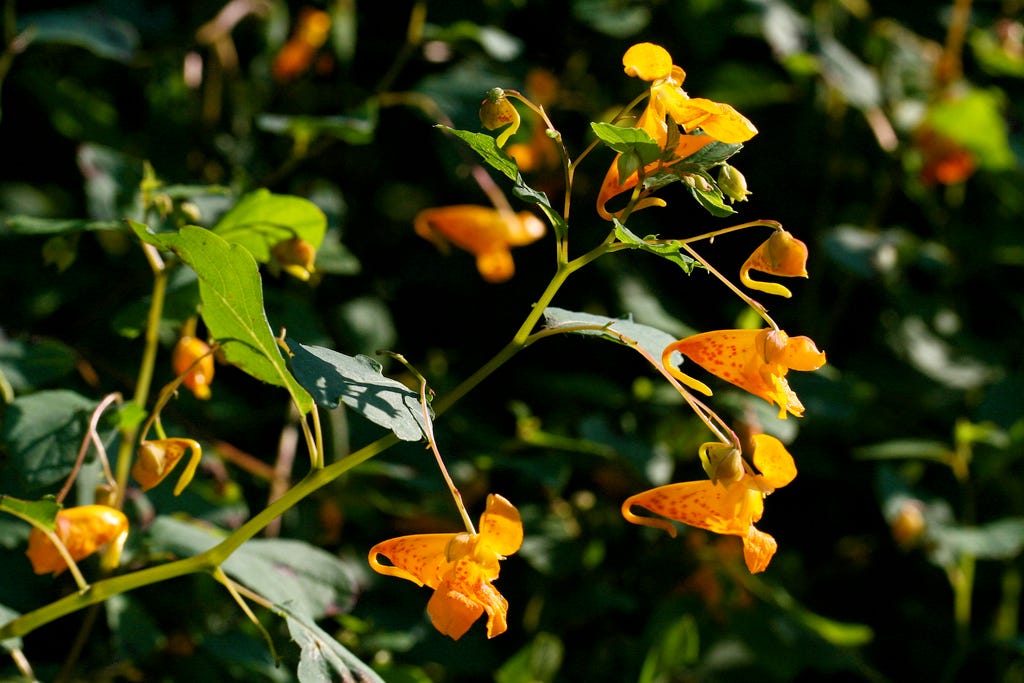Jewelweed, scientifically known as Impatiens capensis or Impatiens pallida, is a native North American plant with a long history of medicinal use. Among its various benefits, jewelweed is renowned for its effectiveness in preventing and soothing rashes caused by exposure to poisonous plants like poison ivy, poison oak and poison sumac.
Preventing and Treating Rashes
One of the most notable health benefits of jewelweed is its ability to prevent and treat rashes caused by the oils from poison ivy, poison oak, and poison sumac plants. The plant contains compounds such as lawsone, quercetin, and kaempferol, which possess anti-inflammatory and antipruritic properties, making jewelweed effective in soothing irritated skin and reducing itching and inflammation. When applied topically, jewelweed creates a protective barrier on the skin, preventing the absorption of urushiol, the allergenic oil found in poisonous plants.
Scientific Evidence
Research supports the traditional use of jewelweed in treating skin conditions. A study published in the "Journal of Ethnopharmacology" found that jewelweed extracts demonstrated significant anti-inflammatory and antipruritic effects in animal models, validating its use as a natural remedy for skin irritations. Furthermore, a review published in the "Journal of Herbal Pharmacotherapy" highlighted the effectiveness of jewelweed in managing various dermatological conditions, including poison ivy rashes.
Forms of Application
Jewelweed can be utilized in various forms to treat skin rashes and irritations. Common preparations include:
Topical Balms and Salves: Jewelweed-infused balms and salves are easy to apply directly to affected areas, providing immediate relief from itching and inflammation.
Jewelweed Soap: Jewelweed soap can be used during baths or showers to cleanse the skin and alleviate symptoms of poison ivy rash. It helps remove urushiol oil from the skin, preventing further spread of the rash.
Jewelweed Lotion: Lotion formulations containing jewelweed extract can be applied generously to affected skin to moisturize and soothe irritation.
Where to Find Jewelweed
Jewelweed is commonly found in moist, shaded areas such as woodlands, along stream banks, and in damp meadows throughout North America. It typically thrives in environments where poison ivy and poison sumac plants are prevalent, making it a convenient natural remedy for individuals at risk of exposure to these poisonous plants.
The Antidote to Urushiol
Jewelweed's remarkable ability to prevent and soothe rashes caused by poisonous plants like poison ivy and poison sumac makes it a valuable addition to natural skincare remedies. Supported by scientific evidence and traditional use, jewelweed offers a safe and effective alternative to conventional treatments for skin irritations. Whether in the form of salves, soaps, or lotions, incorporating jewelweed into skincare routines can provide much-needed relief for those experiencing the discomfort of poison plant rashes.
Sources:
1. Bingham, R., & Nelson, K. (1998). Antipruritic and antinflammatory effects of an extract of Impatiens capensis. Journal of Ethnopharmacology, 61(3), 229-232.
2. Foster, S., & Johnson, R. (2006). Desk reference to nature's medicine. National Geographic Books.
3. Schnaubelt, K. (1999). A review of jewelweed as a medicinal plant: a traditional herbal remedy with modern clinical applications. Journal of Herbal Pharmacotherapy, 1(3), 77-82.





